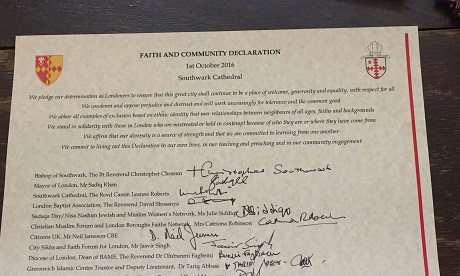Priests from the Church of England copied Martin Luther’s means of protest against the Church during the past week.
They stuck a copy of their complaints to the doors of five cathedrals.
The priests’ actions mimic the fable that Luther nailed his 95 theses against the Catholic Church to the door of a chapel in Wittenberg, Germany, 500 years ago.
Luther’s action marked the beginning of the Reformation.
Given the international commemorations marking the 500th anniversary of Luther’s protest, the current protest aimed for maximum publicity.
The priests’ complaints are encapsulated in the Southwark Declaration.
The declaration focuses on the priests’ concerns that the Anglican Church is corrupt by allowing gay couples to marry.
The Southwark Declaration, which contains five statements, was first published in 2015.
It affirms the “supreme authority” of the scriptures and calls on Church leaders to uphold the doctrine that marriage is the lifelong union of one man and one woman.
Last week’s complaints were accompanied by the following statement, which accuses the Church of “revisionism”.
“The Church of England claims it has not changed its doctrine, but its practice on the ground has already changed: clergy are already adopting lifestyles which are not biblical and teaching that such lifestyles are holy in the sight of God.
“This revisionism is causing a crisis not only in Southwark Diocese but across the Church of England.
“It is weakening and destroying the Church as it has done in the United States and Canada.
“When the Church redefines sin and eliminates repentance, it can no longer offer the good news of eternal salvation from sin in Jesus; the Church no longer remains distinctly Christian.”
Bishops have “a narrow window” until the next General Synod in February, it says, to “regain the confidence of Bible-believing Anglicans” and avoid “rupturing” the Anglican Communion.
In response, the Archbishop of Canterbury called for “unity in our diversity” during his sermon at the Reformation anniversary service at Westminster Abbey on Tuesday.
“Luther set the Gospel free, and as human beings we seek continually to imprison it behind ritual and authority — or to make it serve politics or causes.
“Will we be willing ourselves to be reformed again and always, setting aside our differences because we are caught up in the grace that is found through faith?”
Source
image: The Diocese of Southwark
